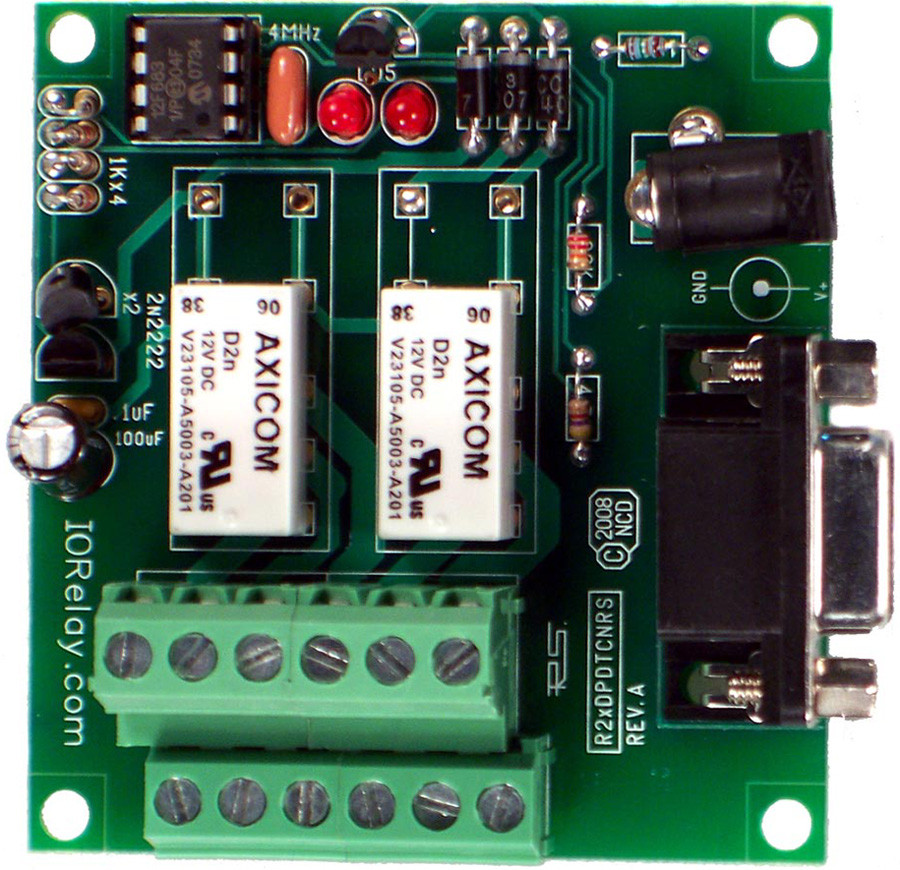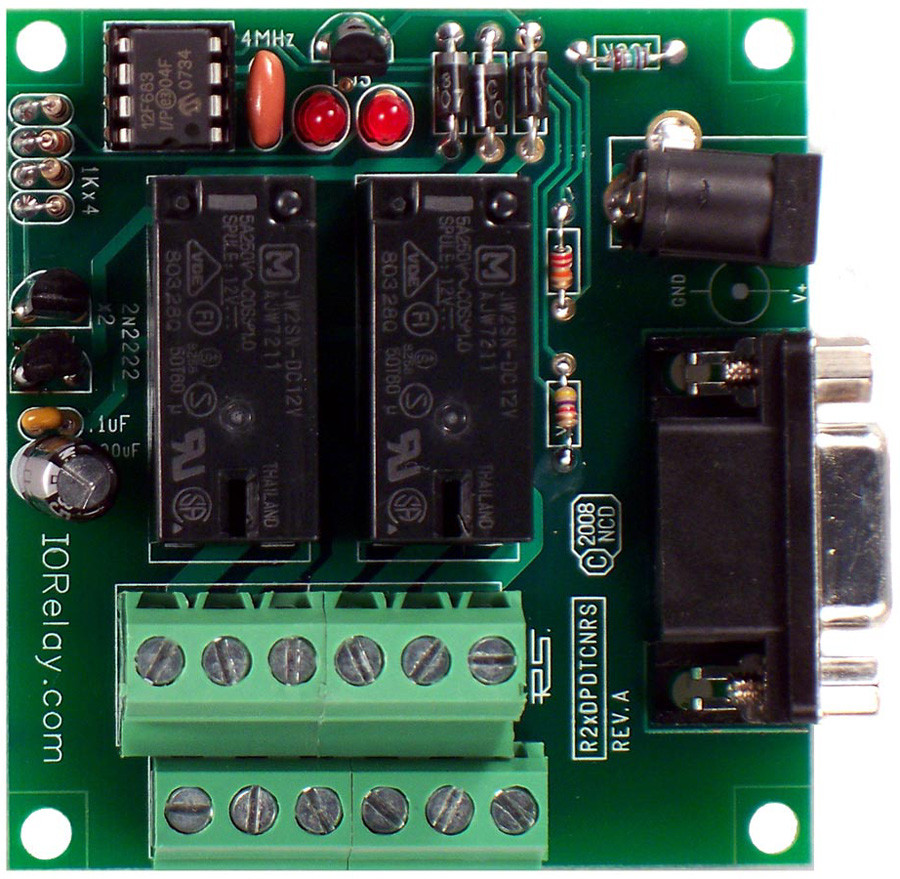RS-232 2-Channel DPDT Relay Controller with Serial Interface
Highlights
- DPDT Relay Configuration
- 9600 Baud Operation
- Relay Status LEDs
- Integrated Standard Serial and Power Connector
- Convenient Terminal Blocks for Easy Electronic Connections
- High-Quality Sealed Relays
- Overkill Transistor Drivers
- +12 Volt Operation, 2-Wire RS-232
- No-Click Power-up
- See Manual for Outline Dimensions
Dual Relay with Quick Connect Terminal Blocks
Control One or Both Relays with Two-Way Communication
On-Board Easy RS232 Connection
Highly Reliable Relay Board For Demanding Applications
RS-232 Serial Relay Controller
This simple RS-232 Relay board was designed to offer basic relay control functions using the RS-232 port of your computer. Supports Relay On and Off commands and reading the status of relays. Provide +12 Volts DC to the board, and send ASCII character codes to control the relays. Even a no-frills design deserves a high-quality driver stage, and that’s exactly what we put on our Serial Relay Controllers. Fast-reacting flyback diodes help shunt dangerous voltages away from the driver circuit.
Features include no-click startup and LED status lights. Relays can be controlled at 9600 baud and the board is compatible with ANY computer or microcontroller capable of delivering RS-232 data.
Connect this board to the USB port of your computer using a USB to Serial adapter. The USB to Serial Adapter is to be used with the Quick Start Kit and is available at checkout.
NCD Component Library
Fully functioning programs for R25, R210, R220 and R230 are included with the NCD Component Library. With the NCD Component Library we’ve “started” the programming for you. We say started because these are fully functioning samples but we’ve also included the source code so you can customize them to your exact needs. The NCD Component Library is a plug-in for the Visual Studio 2005/2008 that greatly simplifies the communications to the NCD product line. The samples can be run in Visual Studio and fully customizable to your needs. Two different dual channel samples are available to turn on and off the relays, read the status of the relays and retrieve startup default state of relays. To view screen shots of each sample visit our NCD Component Library Page. Start by downloading the FREE NCD Component Library and you will be communicating with any NCD device faster that ever!
The above sample demonstrates control and status read of 2 Relays. Compatible with all R2x RS-232 Series Relay Controllers.
The above screen shot shows one of two fully functioning dual channel samples that are available with the NCD Component Library. View all the examples on our NCD Component Library Page.
Associated Part Numbers
This product may have been previously manufactured using a part number shown below:
Relay Options
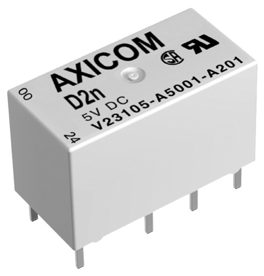
1-Amp DPDT Signal Relay Option
This controller offers an optional 1-Amp small signal relay, allowing control of low-power telecommunications signals up to 12VDC at 1 Amp. Ideal for audio, telecommunications, and very low power switching applications. This relay has a low On resistance. The 1-Amp signal relay is of the DPDT variety, which is the same as two SPDT relays that switch simultaneously, but remain isolated from each other. This relay has 6 total user connections, two of each of the following: Common (C), Normally Open (NO), and Normally Closed (NC). Common is connected to NC when the relay is off. Common disconnects from NC and connects to NO when the relay is activated. All connections are made via screw terminals, capable of accepting up to 16 AWG wire. Review Datasheet
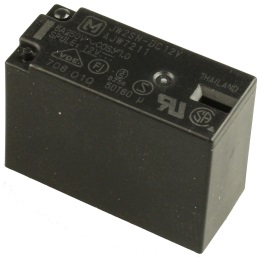
3-Amp DPDT Signal Relay Option
This controller offers an optional 3-Amp small signal relay, allowing control of low-power telecommunications signals up to 12VDC at 3 Amps. Ideal for audio, telecommunications, and very low power switching applications. This relay has a low On resistance. The 3-Amp signal relay is of the DPDT variety, which is the same as two SPDT relays that switch simultaneously, but remain isolated from each other. This relay has 6 total user connections, two of each of the following: Common (C), Normally Open (NO), and Normally Closed (NC). Common is connected to NC when the relay is off. Common disconnects from NC and connects to NO when the relay is activated. All connections are made via screw terminals, capable of accepting up to 14 AWG wire. Review Datasheet
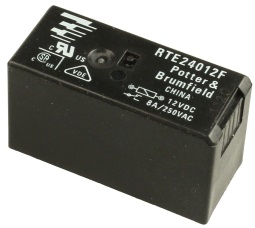
5-Amp DPDT Signal Relay Option
This controller offers an optional 5-Amp signal relay, allowing control of signals up to 12VDC at 5 Amps. Ideal for audio, telecommunications, and light-duty power switching applications. This relay has a low On resistance. The 5-Amp signal relay is of the DPDT variety, which is the same as two SPDT relays that switch simultaneously, but remain isolated from each other. This relay has 6 total user connections, two of each of the following: Common (C), Normally Open (NO), and Normally Closed (NC). Common is connected to NC when the relay is off. Common disconnects from NC and connects to NO when the relay is activated. All connections are made via screw terminals, capable of accepting up to 14 AWG wire. Review Datasheet
Mechanical Drawing
Wiring Diagrams
Essential
Tutorials
- Unable to Mount Virtual COM Port in Windows 10
- Controlling Inductive Devices: Managing Induction & Electromagnetic Interference
- Introduction to Computer Controlled Relays and Switching
- Relay Logic
Documentation Downloads
Download NCD Base Station
Introduction to Relay Control
This video will guide you in determining which relay controller you need for your application as well as a general overview of the differences between Relay Options. If you’re new to our products or just need a refresher for a new application this is a great place to start.
Induction Suppression
Learn about Induction and how it comes into play with Relay Controllers. Induction suppression can make your Relay Control applications intermittent and unreliable. This video will show you what causes it, how to avoid it, and how to account for it in your application.
RS-232 Serial Compatibility Notes
The NCD RS-232 Serial communications module is compatible with standard RS-232 signals (+/-10VDC), which are not directly compatible with UART signals from a microprocessor. If you are working with Arduino, Microchip PIC, or other common microcontroller, a communications module is not required. Microcontrollers will directly talk to the on-board processor of all NCD controllers.

